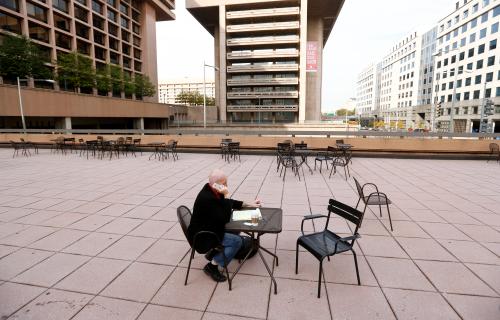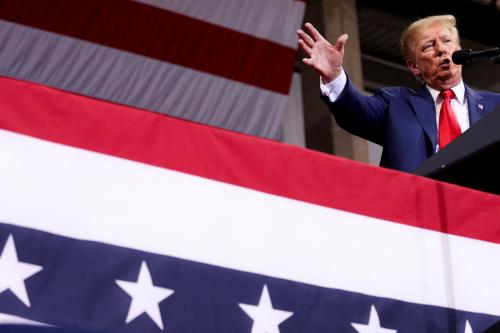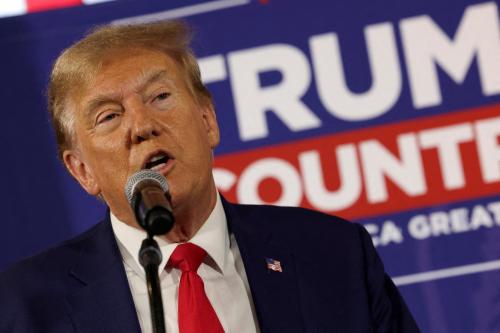President Trump’s animus toward Washington Post owner Jeff Bezos appears to have led the Department of Defense (DoD) to delay its $10 billion cloud computing procurement, in which Mr. Bezos’s Amazon is the front-runner. Before the president upends the competition altogether, he should motorcade five blocks east on Pennsylvania Avenue to the Old Post Office-turned-Trump International Hotel. This historic landmark bears his name precisely because of the insulation of federal procurement decisions from politics—a bedrock principle of U.S. governance and one that has helped us to combat cronyism and corruption around the world.
The Pentagon’s potentially massive contract ($10 billion is the ceiling, not the floor) is designed to bring the military into the modern era of cloud-based data storage and analysis. Named with a nod to the fictional heroes of “Star Wars,” the Joint Enterprise Defense Infrastructure, or JEDI, is a winner-take-all procurement with only two remaining competitors (Microsoft as well as Amazon). Oracle, IBM and others were eliminated from the competition because they could not provide the scale of services required by the contract. Although prominent procurement experts have criticized the structure of JEDI as inconsistent with competition and innovation, DoD maintains that a single entity can best provide advanced, secure services to warfighters.
DoD was expected to award JEDI late this month. However, after a federal court rejected their appeal in July, challengers went to the president. Citing “tremendous complaints” from “some of the greatest companies in the world,” President Trump asked Pentagon officials to review the JEDI contracting process, and the new Defense Secretary, Dr. Mark Esper, has said DoD will not make a decision until he has completed his examination.
Even before taking office, President-Elect Trump made news criticizing over-budget defense contracts, including Boeing’s deal to build a new Air Force One and Lockheed Martin’s long-troubled F-35 Joint Strike Fighter. This is not unprecedented: President Obama was critical of the cost of a planned new presidential helicopter. But JEDI is a pending contract award, which makes President Trump’s potential interference, while not illegal, exceedingly irregular. It is particularly suspect because the president openly derides Mr. Bezos and has repeatedly attacked Amazon, which he says exploits the U.S. Postal Service and fails to pay its fair share of taxes. The president recently tweeted a link to a Fox News segment that referred to the DoD cloud procurement as “Bezos bailout.”
The president’s seeming willingness to use the federal procurement process for political purposes is as ironic as it is troubling. In early 2012, in a high-profile decision, the U.S. General Services Administration (GSA) selected Mr. Trump to redevelop an iconic federal building just blocks from the White House. GSA had invited bids from developers willing to repurpose the Old Post Office—an 1899 Romanesque Revival structure that historic preservationists rescued from demolition in the 1970s—in exchange for a 60-year lease. After a lengthy process controlled by civil servants, GSA selected the Trump organization’s proposal over nine others, in part because of the relative size of its pledged investment in restoring the underutilized building (~$200 million).
GSA’s decision came as a surprise to almost everyone, including Donald Trump. As with JEDI, the losing bidders, which included Hilton and other major hotel chains, waged a campaign of criticism in the press and on Capitol Hill, and formally challenged the selection process. Although GSA rejected the appeal, the agency’s decision remained highly controversial among many members of Congress and Trump detractors of all stripes.
Along with newly named GSA Administrator Dan Tangherlini, I inherited the controversy when I became GSA’s Public Buildings Commissioner in late 2012. (Mr. Tangherlini’s and my predecessors had left GSA for unrelated reasons soon after the agency selected the Trump organization as the Old Post Office lessee.) We lawyered up, studied Mr. Trump’s “The Art of the Deal,” and spent the next year negotiating the terms of the lease. We repeatedly told our team that no deal was better than a bad deal—i.e., one that did not fully protect taxpayers’ interests and preserve the building’s historic integrity. What we did not do was to question GSA’s award decision itself, in deference to the trustworthiness of the process.
President Trump’s refusal to fully divest himself of the hotel following his election has become the focus of a new, heightened dispute and multiple lawsuits. But those controversies are not connected to GSA’s original leasing decision, and procurement experts still hold up that decision as a triumph of process over politics. Dr. Steve Kelman, a professor at Harvard’s Kennedy School who led the Office of Federal Procurement Policy in the Clinton Administration, has marveled at a system that could award such a high-visibility contract to a vocal critic of President Obama and a leading champion of the “birther” claim that Mr. Obama was not born in the United States.
“In many, many countries around the world it would be unthinkable for a prominent opponent of the government to win a contract such as this—or any government contract, for that matter,” wrote Dr. Kelman in a 2014 blog post about the Old Post Office. Citing research which shows that the ability of people who lack political connections to do well is a key predictor of a nation’s level of innovation and entrepreneurship, he argued that having a procurement system insulated from partisan politics is “not only great from a perspective of public ethics, but also great in terms of long-term economic growth and prosperity for our country.” (Dr. Kelman received a handwritten note from Mr. Trump thanking him “for the kind words” in the blog post.)
Despite having reaped the benefits of merit-based federal contracting, Mr. Trump now appears willing to put politics over process. This will not end well. Contrary to his stated intent, political intervention in federal procurement decisions will increase the government’s costs, as companies raise their prices in response to a greater risk of contract termination or opt not to bid on federal contracts altogether (responding to a major federal solicitation is not inexpensive). Political intervention will also delay much-needed acquisitions, as contracting officers slow the process for fear of partisan scrutiny.
Given the scale of federal procurement—the government spends more than $400 billion on procurement contracts every year—such adverse effects can harm the overall economy. Even more significant is the incalculable cost of diminished public trust in the federal contracting process.
When President Trump looks at the refurbished Old Post Office, he no doubt sees it as a tribute to his skill as a developer. He should also see it as a poster child for a federal contracting process that works best when it operates free of politics.
Dorothy Robyn was the GSA Public Buildings Commissioner from 2012-2014. From 2009-2012, she was the Deputy Under Secretary of Defense for Installations and Environment.
The Brookings Institution is committed to quality, independence, and impact.
We are supported by a diverse array of funders. In line with our values and policies, each Brookings publication represents the sole views of its author(s).










Commentary
A disturbance in the Force: President Trump, DOD’s JEDI procurement, and the Old Post Office
August 23, 2019